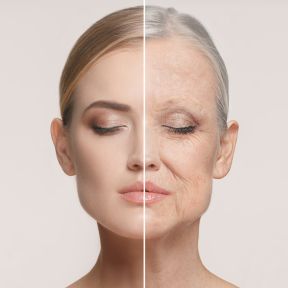I remember approaching my 50th birthday with some trepidation. It felt like a halfway mark, although it likely was well past that. My grandmother used to say that things get less after reaching halfway, even though they’re getting less from day one. I guess it’s because that’s about when you start paying attention.

And so I thought turning 50 meant I’d change in some way. But no such thing happened, really. I didn’t suddenly become wiser or start thinking differently. I didn’t change the way I dressed or what I put in my body or on my face—even though my oldest daughter insisted I start wearing anti-aging creams.
When I was in my mid-30s, a friend in her early 40s had said the face takes a hit when you turn 40. I was well past that age, and thank you, genes, I hadn’t noticed a thing. Had I passed the litmus test of lasting youth?
But then, things did begin to change. Initially, I couldn’t quite tell what it was because it was so subtle. I couldn’t point to anything significant except in fleeting moments. What I did feel, though, was that the person looking back at me from the mirror wasn’t the person I knew myself to be.
We were still in the peak of Covid, and Zoom interactions were in full force. I figured I was over-analyzing my face simply because I was looking at it so much and invariably comparing it to all the other faces next to mine in little boxes smeared across the screen.
But then, the subtle shift began to take shape. That ever-so-slight heaviness in my jaw turned into two lumps on either side of my face, and a Google search told me they were called jowls. Google also told me it was part of the ageing process. So was the widening of my forehead (and I’d thought it was because I hadn’t been to my hairdresser for almost a year) and the droopiness of my nose (which I assumed was because I was constantly smiling on Zoom).
It was official. I was ageing. There was no denying it. The unfamiliar shifts that I thought would simply go away were here to stay. I was starting to look like the people I had always classified as old. And honestly, that unsettled me more than I’d ever thought it would.
More than two decades ago, I had to do the work of accepting my body as I recovered from an eating disorder in my early adulthood. I was being called to go it again, albeit in a different way.
It wasn’t about detaching my self-worth from my appearance. Nor was it about feeling right about my body. It was about feeling me in my body. A 50-year-old relationship with someone who looked a certain way had felt familiar. My life was built around it.
I now had to start a relationship with a new person. This meant experimenting, seeing what worked and what didn’t. Creating space in my life for new routines, and yes, Retinol-A was finally part of it. It was about slowing down and listening to my body, but also to my emotions, because getting older does bring some grief. It’s the loss of life as we knew it.
What has helped me are three things in particular. The first is self-compassion, to be by my own side with tender loving care—so important in a world that tells us we’re broken because we’re older. Self-compassion is the bedrock of courage, wisdom, empathy, and every human value we aspire to. When I tune in with compassion, I’m reminded that midlife is actually an invitation to become whole again.
The second is humor. It’s not the laugh-out-loud kind of humor that is often at someone’s expense. It’s more a detached awareness of the ways our minds torture us and drain us of energy. It’s smiling at that inner voice that sees your sagging breasts or receding hairline and starts throwing a fit. It’s tossing your head when it says you need Botox for your frown lines or smile lines and showing up with energy anyway.
And the final one is perspective. I believe that humor and perspective are the greatest gifts of midlife because they have the power to untie the apron strings of society’s demands. I had a glimpse of that just yesterday when I took my girls shopping. The mayhem in the stores, the thousands of energetic young adults rushing in and out of changing rooms and hustling to grab the perfect find, reminded me of my own earlier years.
But instead of longing for the rush and excitement I felt at the time in these pursuits, I felt strangely liberated. In that dazy, hazy moment, as the world scurried around me, I felt a lightness of being that was truly magical.


